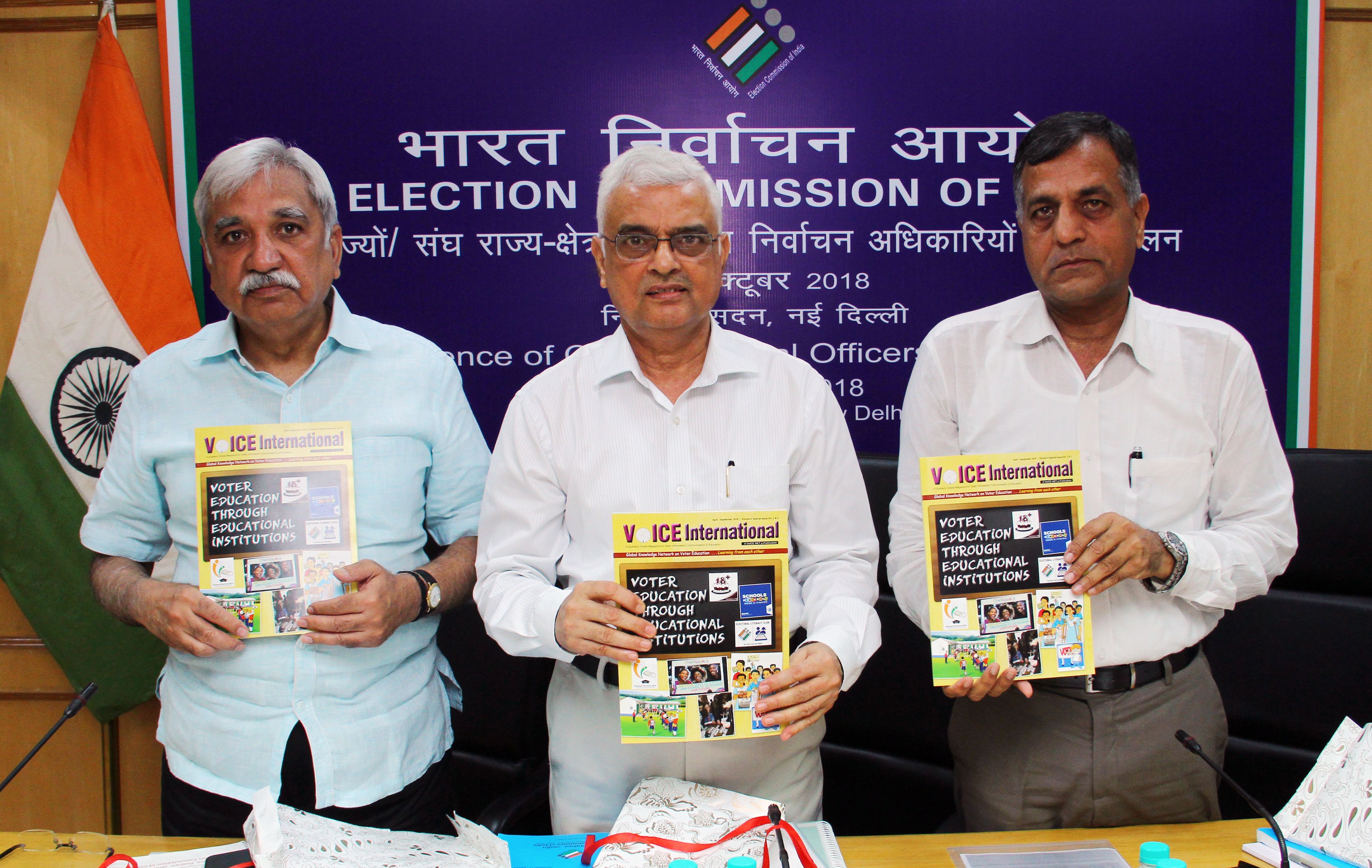Search the Community
Showing results for tags 'voter education'.
-
WHEN STUDENTS SHOW THE WAY: A SUCCESS STORY OF ELECTORAL EDUCATION PROGRAMMES AMONG TRIBES IN KERALA Biju Lekshmanan, Sathyan T., Dileep P.Chandran The inhabitants of remote tribal hamlets in Attappadi experienced several physical and social constraints to turn out to vote. The community intervention programmes led by the school students of the Electoral Literacy Club (ELC) in collaboration with Students Police Cadets (SPCs) resulted in a surge in voter turnout in these areas in the elections to the 2019 Lok Sabha and 2021 Kerala Legislative Assembly. It was the participatory electoral education activities of the students that helped ensure the participation of tribes in the electoral process. The Attappadi model redefined the functional scope of ELCs. The successful engagement of Student Police Cadets (SPCs) in electoral education campaigns in Attappadi also drove authorities of SPCs to broaden their functional scope to include electoral awareness programmes for target groups. Activities of the ELC and SPCs in the Attappadi model showcased the critical role students can play in community intervention programmes. The students members of ELC and SPC in Government Higher Secondary School, Agali, in Attappadi jointly conducted elctoral awareness programs in the tribal hamlets of remote ares in Attappadi to address the problem of voter turnout. Together, these two student clubs, along with Election Commission, Police personnel, Departments of Forest, Education and Tribal Welfare, and the Parents and Teachers Association (PTA) at school, conducted electoral awareness classes in each tribal hamlet. During their holidays and stay-back after school, students taught tribes why they must vote and even taught them how to do it! The activities of the students were not confined to structured electoral awareness campaigns. Regular messages on the importance of electoral participation were imparted through the large school assembly of Agali Higher Secondary School where around 60% among 2,600 students belong to the category of Scheduled Tribes. These students were urged to spread the same message to their parents. The ELC members also assisted people in registering in the electoral roll. They sent messages in multiple tribal languages to the young people in tribal hamlets and taught them how to register their vote. Students also created a video message of veteran singer Nanji Amma from the community to educate tribes on the importance of casting their vote. Students of ELC and SPC carried posters and notices to the remotest tribal hamlets in Attappadi and explained the content to tribes in their tribal languages. They also ideated on new ways to communicate the messages to electors during the pandemic period–for instance, pictorial messages on electoral participation were circulated even through printed masks. Members of ELC and SPC identified senior citizens and Persons with Disabilities (PwDs) from tribal hamlets and helped them to utilize the new facility of postal ballot. They also ensured their assistance to those who wished to vote directly on the polling day. Additionally, through the Young India campaign, ELC and SPC members taught young electors in the tribal hamlets to use mobile applications of the Election Commission like cVIGIL and the Booth App. Young people were also taught to utilize online services available on the National Voters Service Portal. A help desk for young people was also opened in the school. A football competition conducted by the district administration also attracted the attention of young people to their political socialization initiatives. Students used all means possible to educate people on the importance of participating in elections. They even requested priests to appeal to people to cast their vote. This earned good results in Mele Mulli and Keezhe Mulli, tribal hamlets on the Kerala-Tamil Nadu border. Students of ELC and SPC continued their efforts to increase political participation on polling day. They assisted people from remote tribal hamlets to cast their votes democratically without fear or favour. They helped tribal people, senior citizens and PwDs to commute and vote and arranged transportation facilities to all tribal hamlets inside the forest. They also arranged wheelchairs and ambulances for those who needed them, and set up a help desk for them. Further, at the polling booths, they assisted the Election Commission in offering refreshments to voters from the remote areas and helped voters to follow Covid protocols on polling day. (Student police cadets assisting a physically challenged voter to arrive polling booth) One of the attractions of SPC is its khaki-coloured uniform similar to a police officer. The activities of ELC in tribal hamlets were carried out in SPC uniforms. Even their Political Science teacher Sathyan who was in charge of both SPC and ELC at the school accompanied the students in uniforms. Voter education programmes carried out by their own children in uniforms, with support from police officers and district authorities, created a sense of privilege in the minds of the inhabitants of tribal hamlets in Attappadi. Electors in the tribal hamlets could not reject the emotional appeal of their children to participate in electoral process. The students also ensured the cooperation of the tribal chiefs of each tribal hamlet in the electoral education programmes. The commands of tribal chiefs in favour of electoral participation also moved people to vote. Another important factor for the success of the Attappadi model was language. Electoral education classes in each hamlet were led by the ELC member from the same hamlet in their respective tribal language. Teachers who know native languages also helped students to lead classes. The classes in tribal languages converted inhabitants of tribal hamlets from passive recipients to active participants. People started to clarify doubts and asked students to repeat instructions they could not understand in these classes and voice messages through social media to young electors were also in their tribal languages. The success of Attappadi model emanated from its participatory nature. It teaches policy makers that any inititaive seeking the participation of people should be sensitive to their cultural, political, social and economic needs. ELC and SPC groups also showed swiftness in responding to situations. During the 2019 Lok Sabha election, electors in Murugala did not turn out to vote till afternoon. The team led by ELC nodal officer Sathyan went to their hamlet and brought them to the booth by crossing the Bhavani River by foot! Another significant impact of the intervention for electoral participation was from Thadikkundu hamlet. Electors in this hamlet had decided to boycott the Lok Sabha election in 2019, but members of ELC and SPC persuaded and convinced them to vote. As a result, 98% of the electors from Thadikkundu turned out to vote in that election. Continuous initiatives, activities and electoral education programmes of ELC and SPC in Attappadi significantly increased voter turnout in the elections to the 2019 Lok Sabha and the 2021 Kerala Assembly. A significant 14% increase happened to mark the highest ever voter turnout (73.08%) in the 2019 Lok Sabha election as compared to previous elections at the Chindakki booth where tribal electors were in a majority. The ELC and SPC campaign for mandatory registration to the electoral roll resulted in the increase in the number voters among tribes. Voter turnout crossed 80% in all tribal hamlets in Attappadi where electoral socialization programs were conducted by ELC and SPC. The success of the electoral education programmes in 2019 encouraged students to expand the scope of their activities into tribal hamlets of three panchayaths during the election to the Kerala Legislative Assembly in 2021. Tribal hamlets of Varkamabadi, Vellakulam, Vechypathy, Nallasinka, and Chavadiyur in Sholayur panchayat on the Kerala-Tamil Nadu border responded positively to the activities of the young brigade. Students also visited a number of tribal hamlets in Agali and Pudur panchayats such as Kottamedu, Narassimukku, Pattimalam, Chalyur, Elachivazhi, Cheerakadav, and Padavaya where more than eighty percent electors turned out to vote in all tribal hamlets. Vote vandi: a SVEEP initiative to introduce EVM touring in tribal hamlets of Attappadi Story-33 A SUCCESS STORY OF ELECTORAL EDUCATION PROGRAM AMONG TRIBES (1).pdf
-
-
The Chief Election Commissioner of India Mr. O P Rawat, Election Commissioners Mr. Sunil Arora and Mr. Ashok Lavasa launched the special issue of the VoICE International(April-September 2018) magazine in Chief Electoral Officer’s Conference on October 4, 2018 at ECI Headquarters. The theme of the special issue (April – September 2018) of Volume II of the magazine is ‘Voter Education through Educational Institutions’. It primarily focuses on introducing greater electoral awareness and sensitivity among the future generation of voters and electoral participants; an issue that has great significance and relevance for investment in the future of Electoral Democracy. Apathy of the youth towards electoral participation and non-exercise of their franchise by a large proportion of them is a major concern in several democratic countries. In this respect, effective electoral literacy programmes through school and college level initiatives are an important means of encouraging participation of youth in the electoral process. Further, the outreach of electoral literacy initiatives can be increased manifold through the use of electronic, internet and social media. Most of the democracies across the world, conscious of the importance of such initiatives have taken significant steps towards introducing several initiatives toward their electoral literacy programmes using both formal and informal channels. This issue highlights such initiatives across the world. Apart from contributions on the core theme, the magazine also features other articles by member Election Management Bodies(EMBs) on other important and pertinent subjects. The e-book of the magazine is available at http://voicenet.in/. All the prior issues (e-book/ pdf) of VoICE International are available at http://voicenet.in/voiceinternational.htm. VoICE International is the quarterly e-publication on the VoICE.NET (Voter Information, Communication and Education Network) portal, a Global Knowledge Network for sharing knowledge, resources and expertise on Voter Education. VoICE.NET was launched on October 20, 2016 at the International Conference on Voter Education for Inclusive, Informed and Ethical Participation held at New Delhi. The Global Knowledge Network is a part of the New Delhi Declaration adopted at the Conference by the 25 Election Management Bodies and representatives from UNDP, International IDEA, IFES and Malaysian Commonwealth Studies Centre. At present, VoICE.NET has 27 members, which includes Election Management Bodies (EMBs) across the world and reputed international organizations. The portal is managed by Election Commission of India.
-
- voice international
- magazine
-
(and 3 more)
Tagged with:
-
-
-
- delhi
- voter education
-
(and 3 more)
Tagged with:
-
-
- delhi
- voter education
-
(and 1 more)
Tagged with:
-
From the album: Visit of Students from Andhra School, New Delhi to Election Education Centre Cum Museum O/o CEO, Delhi.
Visit of students to Delhi Election Museum








